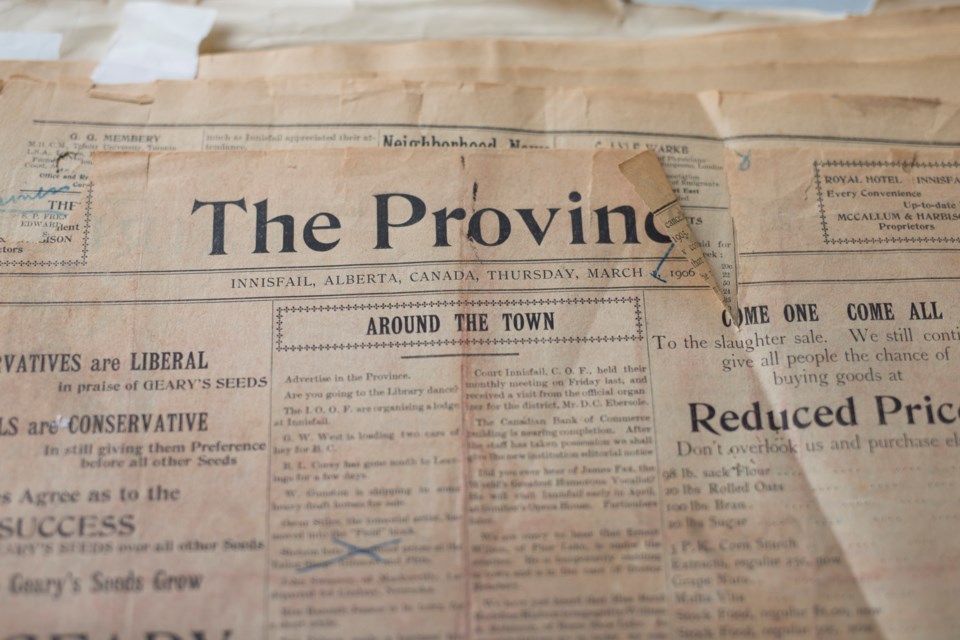INNISFAIL – In 1904 the town’s new pioneer telephone directory was released for 42 residences, businesses and services.
The telephone number for town hall and police station was 17. The Union Bank of Canada had 23. Six was reserved for the Innisfail Free Lance, a local newspaper since Sept. 2, 1898.
However, number 1 was reserved for a new newspaper office called The Province, which reportedly was about to buy out the Free Lance and begin operations the following year. S.P. Fream, an auctioneer and real estate agent, became the newspaper’s first editor and publisher. His residential telephone number was 2.
For the next 115 years the Innisfail Province was the town’s number 1 source for news; through the booming good times of pioneer optimism, the hard times of the Depression, two world wars and pandemics, including the Spanish Flu from 1918 to 1920.
“Some places report the second wave to be more deadly than the first one, while other states the reverse is the case,” reported the Province in a 1918 article. “Whether from withdrawal of the mask order, or from whatever cause it may be, there have been several new cases in Innisfail.”
Just over a century later the Province has reported on all the latest developments of the COVID-19 pandemic. However, the Province’s coverage officially ends as the town’s longstanding newspaper of record ceases publication. March 24 was the last print edition published. Innisfail’s news will now be brought to citizens through the newly branded regional newspaper, The Albertan, and its website.
In recent weeks, Anna Lenters, the president of the Innisfail and District Historical Society, nostalgically poured over hundreds of archived pioneer Province newspapers dating back to its earliest years of publication.
"It was shocking but predictable based on what's happening wih our local economy but it was sad still," said Lenters of the newspaper's folding. "It is a passing of a sort."
“A community relies on a newspaper. A newspaper bonds a community. It tells me when my neighbours had a baby. It tells me when there is going to be a funeral so that I can attend it and honour that person,” said Lenters. “The editorials tell me about current events and about things I should be concerned about in my community that maybe I would not have known.”
And it’s just not the people in town who will feel the loss. The Province, a winner of countless national and provincial journalism awards, earned respect and admiration throughout Central Alberta.
“For as long as Alberta has been a province, the Innisfail Province has been a vital part of the community,” said Michael Dawe, the leading Central Alberta historian from Red Deer. "It has kept people informed and also supported countless community projects and organizations. It has left a wonderful legacy. It will be deeply missed.”
While Lenters knows that news delivery will still be available for almost everyone thanks to today’s digital age, she feels two critically important traditions of newspapering could be missing for the public, accountability and trust.
“If it is on the internet there is no one for me to hold accountable. You’re sitting in an office and if I have taken exception to what you’ve said or could prove you’re wrong I could hold you accountable. There is that and that trust factor, holding you to a standard that doesn’t exist on the internet,” she said. “I find what I receive on Facebook or whatever way it comes through is one dimensional. It lacks in depth. That relationship is not there, that character is not there. It’s cold, cold, one-dimensional.”
Nevertheless, the media industry has experienced dramatic changes over the past quarter century. The COVID-19 crisis has put in sharp focus the public’s increased demand for faster up-to-the-minute news delivery. While Lenters is aware most people embrace today’s reality there are those who won’t, especially many of Innisfail’s senior citizens. The town has one of the oldest demographics for communities its size in the province, and seniors, loyal to the tradition and feel of the Province’s print edition, could also be saddened and feel inconvenienced by the newspaper’s demise.
Most importantly, said Lenters, is the loss of the personal relationship between community and newspaper, a relationship where both sides respect each other’s values and ethics while jointly sharing a scared commitment to the community.
“We’ve had a relationship over the years, the museum with the newspaper, where you’ve been able to say, ‘could you provide me with something?’’’ said Lenters. “We do our very best to find it but conversely, I’ve been able to say, ‘we’ve got something coming up that you might want to know about’ and you’ve been able to address that in a timely fashion.
“That is a personal relationship that goes with the newspaper.”



